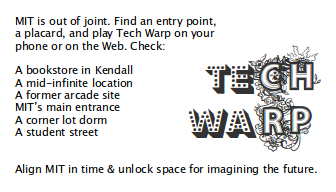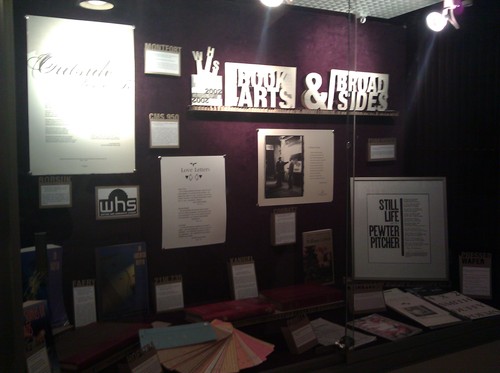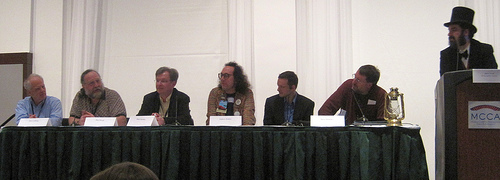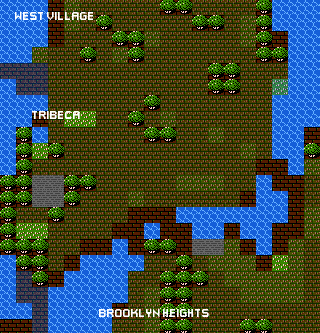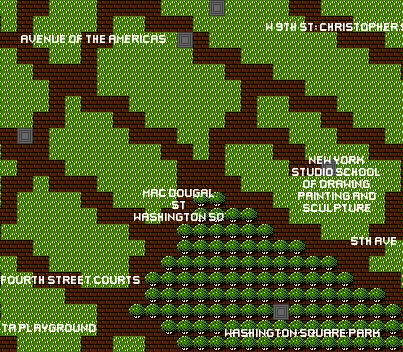I’ve noted here at MiT7 (Media in Transition 7) that we’re now achieved some very reasoned discussion and understanding of the virtues of different approaches to preserving and accessing computer programs. Not that we’ve solved the underlying problem, of course, but I’ve been pleased to see how our overall approach has evolved.
Instead of simply dismissing emulation, migration, or the preservation of old hardware, we’ve had some good comments about the ways in which these different techniques have proven to work well and about what their limitations are. We saw this in the plenary discussion on archives and cultural memory late this morning – audio of that conversation will be coming online. Update: Here it is.
Clara Fernandez-Vara’s presentation “Emulation as a Tool to Study Videogame History” [Abstract] developed this discussion extremely well with regard to one important tool, the emulator. She presented the idea of a game in emulation as facsimile – not the original edition, but also not the Cliff Notes that we’d have to consult otherwise. She showed us a range of work with emulators that gives reserach, teaching, and casual access to older games, which would otherwise be neglected. Saving state, speeding games up, and even playing several of them at once with the same inputs are all facilitated by emulators.
Fernandez-Vara went on to note some limitations of emulation, such as that the physical controller, often significant to play, cannot be replicated in hardware; nor can particular hardware features such as those of the Dreamcast’s VMU or of a C64 floppy drive, which would whirr when something interesting was about to happen in a text adventure. Boxes and manuals are often very important and can’t always be effectively digitized; with online games and worlds, keeping the context is even harder. Finally, emulators have to be updated for new contemporary platforms every few years.
Much of the work of building emulators, Fernandez-Vara also noted, is done by fans who work as volunteers – institutional support can help them and can allow libraries to accumulate holdings. It would be nice if current platforms (the PS3!) were more backwards-compatible, too. “Abandonware” could be officially made available for use, to clear up legal questions.
The only thing I’d add to Fernandez-Vara’s excellent discussion is a slightly different framing perspective on the emulator. The emulated game may be usefully understood as a facsimile, but I see a different way to understand the emulator itself.
My suggestion is that an emulator can be conceptualized as an edition of a computer.
The first edition would be the original piece of hardware – for the Commodore 64, the August 1982 beige keyboard-with-CPU. Actually, in the case of the Commodore 64, even keeping to the United States there are at least three different “hardware” editions, since there are three ROM revisions, one used in very early machines, one in 1982 and 1983 computers, and one that was used in Commodore 64s and in the C64 mode of the Commodore 128. The three ROM revisions are not the only things that changed during the time the Commodore 64 was manufactured and sold, but they do change the behavior of the system. I suppose these better understood as being different “printings,” since the changes are limited to the ROM. That would be an interesting discussion to pursue. Either way, though, printing or edition, there are three different sets of hardware, three hardware Commodore 64s.
When the creators of VICE (the emulator I use) produce a program that operates like a Commodore 64, I understand this as being an edition of the Commodore 64. Yes, it’s a software edition. It isn’t an official or authorized edition – only being a product of Commodore would allow for that. (There are official, authorized emulators, but this is not one.) It’s not, of course, the original and canonical edition. But it’s nevertheless an attempt to produce a system that functions like a Commodore 64, one which took a great deal of effort and is effective in many ways. Thinking of this an edition of the system seems to be a useful way to frame emulation, as it allows me to compare editions and usefully understand differences and similarities.




